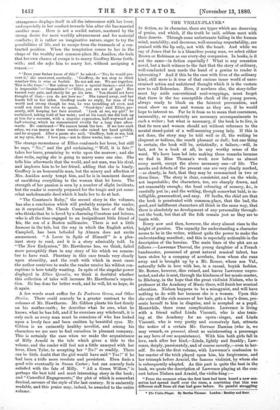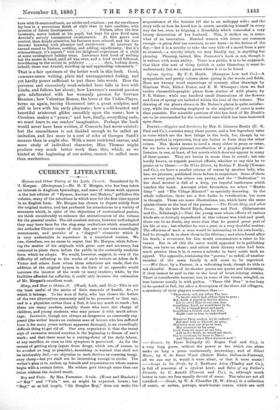THE VIOLIN-PLAYER.'
Is fiction, as in character, there are' re types which are deserving of praise, and which, if the truth be said, seldom meet with their deserts. Through some unfortunate failing in the human mind, amiability, and decorous, well-meaning respectability, are praised with the lip only, not with the heart. And while we say of Jones that he is a blameless young man, we select either Brown or Robinson as our every-day companion. In books, is it not the same—in fiction especially ? What is any sensation novel, but a tacit witness to the fact that the story of ordinary, well-conducted men needs the hand of a genius to render it interesting ? And if this be the case with lives of the ordinary kind, still more is it true of that curious inner world of unre- strained action and unfettered thought which it is the custom now to call Bohemian. Here, if nowhere else; the story-teller must lay aside conventional soul-wrappings, must forget that there is the too susceptible cheek of the young person, always ready to blush on the faintest provocation, and must show us men and women as they are, if he would hope to interest us. Far be it from us to mean that coarseness, immorality, or eccentricity are necessary accompaniments to such a writer ; but what is necessary, if the book is to live, is that its men and women should act without reference to the mental stand-point of a well-meaning young lady. If this is not done, the story may be told well or ill, the writing be eloquent or tedious, the result pleasant or dull; but one thing is certain, the book will be, artistically, a failure,—will, in fact, not be a book at all, in any worthy sense of the word. We have been led into making these remarks because we find in Miss Thomas's work now before us almost every merit, except the above necessary one—of life. The merits and defects of the present one are very clearly marked, —so clearly, in fact, that they may be summarised. in two or three lines. The story is clear, consistent, and on the whole, not improbable; the characters, too, are sharply drawn, and act reasonably enough; the local colouring of scenery, tkc., is carefully put in ; and the writing, though somewhat bald, is in- telligible, grammatical, and easy. Of faults, the chief are that the book is penetrated with common-place, that the bad, the good, and indifferent characters all think in the same way, that there is absolutely no development of any personality through- out the book, but that all the folk remain just as they are to begin with.
Every now and then, however, the story almost rises to the height of passion. The capacity for understanding a character seems to be in the writer, without quite the power to make the understanding manifest; and this is especially noticeable in the description of the heroine. The main lines of the plot are as follows :—Lawrence Therval, the young daughter of a French bandmaster, possessed of great natural musical talent, has been stolen by a company of acrobats, from whom she runs away and is brought up by a Mr. Romer, whose son Val., naturally falls in love with her, in a casual, boyish fashion. Mr. Romer, however, dies ruined, and leaves Lawrence unpro- tected, and she is sent, through the kindness of her music-master, to Blieburg, in the hope that the great violinist Nielsen, who is professor at the Academy of Music there, will finish her musical education. Nielsen happens to be a misogynist, and will have nothing to do with her because she is a woman. Upon this she cuts off the rich masses of her hair, gets a boy's dress, pre- sents herself th him in disguise, and is accepted as a pupil. Meanwhile, there come complications. Lawrence is living with a friend called Linda Visconti, who is also train- ing at the Academy for an opera - singer, and Linda Visconti, who is very pretty and excessively fast, attracts the notice of a certain Mr. Gervase Damian (who is, we may remark, en passant, about as uninteresting a personage as any hero of our acquaintance). With him both girls fall in love, each after her kind,—Linda, lightly and frankly ; Law- rence, deeply, passionately, and of course secretly,—even to her- self. So ends the first volume, with Lawrence's confession to her master of the trick played upon him, his forgiveness, and her triumph before Araciel, the famous violinist, by whom she is subsequently adopted. As this part is quite the beet in the book, we quote the description of Lawrence playing at the con- cert before Nielsen and Araciel, the violin-king :— " From the moment when the first bars bad been heard a new sen- sation had spread itself over the room, a conviction that this was different stuff from all that had gone before. No painful struggling
• The Violin-Player. By Bertha Thomas. London : Bentley and Bons.
here with ill-mastered tools, no tricks and evasions ; yet the excellence lay less in a precocious finish of style than in rare qualities, with promise of future development ..... . . Nielsen, after the first moments, never looked at his pupil, but kept hie eyes fixed upon Araciel's naively transparent countenance. At first grave and neutral, then deeply attentive, his features soon relaxed, and his face became beaming with pleasure and excitement. At intervals he -turned round to Nielsen, nodding, and adding, significantly, But it's extraordinary, it's superb !' with the delighted experience of a child at some unimagined holiday treat. Lawrence took heed of nothing but the music in hand, until all was over, and a loud recall followed,
bewildering to the novice in publicity then, looking down, behold, there was Araciel, standing up and applauding vehemently."
That is a fair specimen of the better work in this book. Good, ,common-sense writing, plain and unexaggerated feeling, and yet hardly power sufficient to put these into words. How the perverse and excessively weak-minded hero falls in love with Linda, and follows 14 about; how Lawrence's musical passion gets adulterated_ with her womanly passion for Gervase Damian; how Valentine Romer, the lover of the Violin-Player, turns up again, having blossomed into a great sculptor, and still in love with his early playmate; how a cold-hearted and beautiful aristocrat glides smoothly upon the scene ; how a Corsican makes a "peace ;" and how, finally, everything ends, we must leave to our readers' imagination. Perhaps the book would never have been written, if Consuelo had never existed; but the resemblance is not decided enough to be called an imitation, and lies more in a sort of echo of Georges Sand's manner than in aught else. With a more restricted canvas, and more study of individual character, Miss Thomas might produce very much better work than this, which, as we hinted at the beginning of our notice, cannot be called more than meritorious.



































 Previous page
Previous page